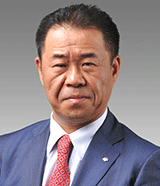Nomura
Nomura wins top brokerage in Japan in Asiamoney’s Brokers Poll 2017 and takes second for combined research and sales in the country.
The firm believes the win reflects its broad customer base across institutional investor, individual and corporate segments. That translates into one of the largest market shares for Japanese equities traded in the country, standing at around 15%.
In a year when the Nikkei is up nearly 19%, the firm has focused on stocks that combine advanced technology and high market share across the world.
“That includes factory automation, semiconductors, and electric vehicles,” Takeo Aoki, head of Japan equity sales for Nomura, tells Asiamoney.
A big development for the firm has been adding small-cap and mid-cap coverage this year.
 |
| Takeo Aoki, Nomura |
“The reason is, so many investors in Japan are foreign and these global investors are diversifying into small and mid cap,” says Aoki. The other change has been the integration of equity sales and trading teams, something that Aoki says the competition in Japan has yet to test.
For Aoki, this can help to better service client needs across sales and execution, as well as leverage the firm’s broader offering beyond cash stocks to products like futures and options.
That has not meant increased expenditures, however. Aoki notes that the changes to both coverage and team structures have happened without new hires but rather through internal reorganization.
As for the market itself, Nomura remains positive on the outlook thanks to improving momentum in the earnings of Japanese companies, more attentiveness to corporate governance and its impact on return on equity, and broad macro conditions, such as interest and FX rates.
“Based on these three themes, I think the Japanese equity market remains promising,” says Aoki.
On the minus side, the firm is looking at two developments. The first is the implementation of the MiFID (Markets in Financial Instruments Directive) II regime. Aoki did not disclose specific arrangements Nomura has made with clients in this regard yet, but he says it has engaged each client in conversations about how the new rules will affect the distribution of its research.
Beyond regulation, geopolitics remains a concern.
“The issues are primarily with North Korea and the Middle East,” says Aoki. “Even though I understand that risks from geopolitical events are not high, I am always mindful of those.”
